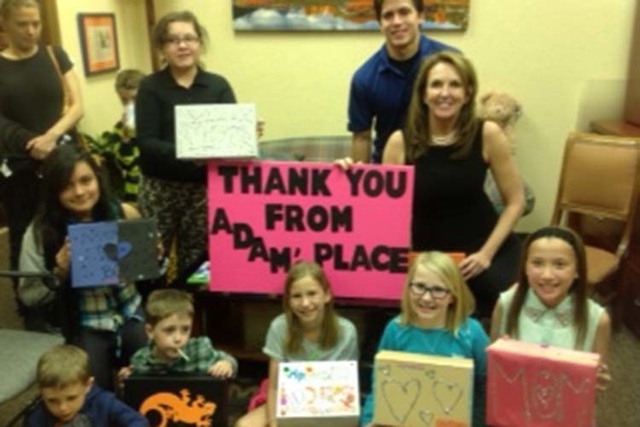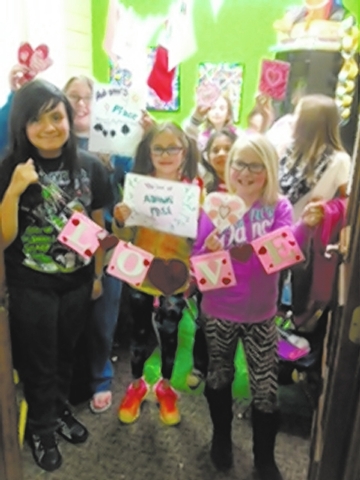Resources available to help grieving parents, children
It’s been said that when a parent dies, you lose the past. When a child dies, you lose the future.
HELPING GRIEVING PARENTS MOVE FORWARD
Kelly Thomas Boyers knows this all too well. In 2007, her son, Adam Thomas, a senior at the University of Nevada, Reno, went out with a buddy to catch a new movie, “300.” He lost control of the SUV he was driving, was thrown from the vehicle and died a week later.
Besides urging a Nevada seat belt law, Thomas Boyers established Adam’s Place, 601 S. Rancho Drive, Building C, No. 19, in 2010. It offers services and provides upbeat support to children 3 to 18 who have lost a loved one. Its services are free, and volunteers are always needed. For more information, call 702-333-2326.
“Healthy coping has the most direct benefit to the child,” Thomas Boyers said. “What we see with the kids is that, after the funeral, after the initial (gestures), their loss gets swept under the rug.”
To offset that, one of the activities at Adam’s Place is making a “memory box” and filling it with photos, poems and items that link the grieving child to his deceased loved one.
Some parents have barely a chance to know their newborn before death occurs. Lisa Weingardt, a labor and delivery nurse trained in grief therapy, is the coordinator of a bereavement group for parents at Summerlin Hospital Medical Center, 657 N. Town Center Drive. It meets every other month. For more information, call 702-233-7103.
“I have families who attended that first meeting who still attend,” Weingardt said. “They are great support for other parents coming in.”
Eight to 15 people show up at any session. Topics have included how to talk to family members about the loss, how spouses can differ in the way they grieve and how to get through the holidays.
North Las Vegas resident Laurie Rogers began attending after giving birth to a stillborn baby girl, Eleanor, in January 2011.
“I’d seen her two days prior, on an ultrasound, and she looked great,” Rogers said. “It was indescribable pain. Because I had kids, I knew what I was missing, what I wanted. For the first three months, I woke every two hours as if to feed a baby. Nighttime was always my favorite with my babies, because it’s quiet … this time, I would wake up and it would just be me. That was the hardest.”
The loss caused her to question her belief in God but ultimately made her stronger in her faith. Now four years out, and with a new child, Elliott, whom she had about a year after Eleanor’s birth, she still attends the support group, now as an example of someone who has healed.
The Rev. Matt Metevelis is the spiritual care supervisor at Nathan Adelson Hospice. He said the five stages of grief — denial, anger, bargaining, depression and acceptance, as outlined in the book “On Death and Dying” by Elisabeth Kubler-Ross — are less a ladder than a fluid path.
Grief is different for those who knew the end was coming than for those who get a call from the police, saying their loved one had an accident, Metevelis said. While the first might have been prepared for the death, they deal with Monday morning quarterbacking — would the outcome be different had they taken their loved one to the doctor sooner, or should they have insisted on a more aggressive medication?
“I don’t think the way in which you lose someone affects the intensity of the grief,” Metevelis said. “I think it affects the (process). … If I lose someone, I’m going to be grieving, no matter what.”
CHILDREN SHOULD NEVER HAVE TO GRIEVE ALONE
Children approach grief in a less constant manner. To help them, Nathan Adelson Hospice, in partnership with The Moyer Foundation, launched Camp Erin Las Vegas, a free weekend overnight camp for children 6 to 17 who have experienced the death of someone. It was held in June.
At the camp, youngsters learned that they were not alone in their grief. Activities allowed them to honor their loved ones, express their feelings and make lasting friendships. Support is key.
“A child should never have to grieve alone,” said Karen Moyer, co-founder and vice president of The Moyer Foundation.
For more information, visit nah.org/center-for-compassionate-care/camp-erin.
Emilio Parga is founder and executive director for The Solace Tree, a nonprofit based in Reno for grieving children, many of whom experience some level of denial.
“I think it’s a natural and normal way to grieve, in general,” Parga said of denial. “We go into shock. All death is untimely. … Because we love, and we feel loss, denial is just part of the process.”
For information about The Solace Tree, visit solacetree.org.
The American Academy of Child and Adolescent Psychiatry notes that children do not have the same reaction to death as adults. Preschool-aged children view death as temporary and reversible, an idea that is reinforced by cartoon characters who die and jump back to life. Those ages 5 to 9 understand that death is permanent but believe it will never happen to them or those around them. So, a child experiences shock and confusion at the death of a brother, a sister or a parent.
Experts say a child who resists attending the funeral should not be forced to go. They suggest finding another way to honor or remember the person, such as lighting a candle, saying a prayer or making a scrapbook.
Psychology Today notes that, “Unlike adults, bereaved children do not experience continual and intense emotional and behavioral grief reactions. Children may seem to show grief only occasionally and briefly, but in reality, a child’s grief usually lasts longer than that of an adult. This may be explained by the fact that a child’s ability to experience intense emotions is limited. … They cannot think through their thoughts and feelings like adults.”
HOW TO APPROACH A GRIEVING PARENT
So, what should people say to parents grieving a loss?
“People don’t know what to say when you’ve lost a baby,” Weingardt said. “… They tend to say the wrong thing — ‘You never really knew your baby’ or ‘You can go on to have another baby’ or ‘Your baby’s in Heaven and happy,’ and those are the things (attendees) say are the most hurtful.”
Likewise, Thomas Boyers said those experiencing grief over the death of an older child do not need to hear, “He’s with the angels” or “He’s in a better place.”
“A better place is with me,” she said. “And saying, ‘Everything happens for a reason,’ well, that’s not so great, either. There’s no ‘reason’ I wouldn’t want my child here with me. The most important thing is to listen — active listening where you’re nodding your head and letting them share their story, share a memory. We’re not very good about talking about death in this society. But to not acknowledge it, is like saying, ‘Oh, I didn’t notice that you were missing your right arm.’ Take five minutes and share a moment with them.”
Adam’s Place currently offers sessions twice a week but is looking to expand its program. Volunteer facilitator training is planned for those who are able to volunteer four hours a month for nine months. Training is scheduled from 9 a.m. to 4:30 p.m. Sept. 6 at Beacon Academy, 7360 W. Flamingo Road. For more information, visit adamsplaceforgrieflasvegas.org.
Contact Summerlin Area View reporter Jan Hogan at jhogan@viewnews.com or 702-387-2949.
This is the third story in a three-part series on bereavement support groups and the grieving process.


















